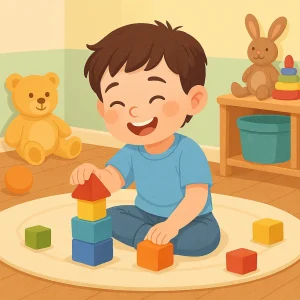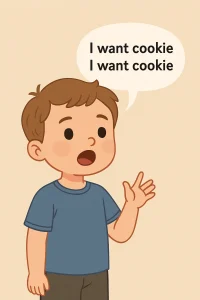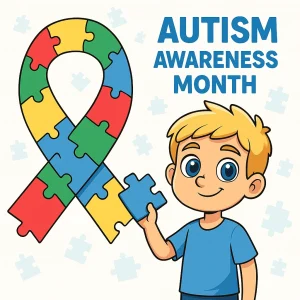Autism Signs in Indian Children: A Guide for Parents in the USA
By Wellness Hub
Last Updated: April 11, 2025
Raising a child in a different country comes with both opportunities and challenges — especially when developmental concerns like autism arise. For many Indian parents living in the USA, recognizing early signs of autism in their children can feel confusing, emotional, and even isolating. Questions like “Is it just a speech delay?”, “Will my child grow out of it?”, or “Should I be worried yet?” often go unanswered — sometimes until it’s too late for early intervention.
Understanding the signs of autism in Indian children is not just about awareness — it’s about acting early and wisely, especially in a multicultural environment where parenting norms and expectations may differ. The good news? Help is available, and it starts with knowing what to look for.
Take the first step with this free Autism Screening Test — designed to help Indian parents like you identify early red flags and seek support confidently.
Why Indian Parents in the USA May Miss Early Signs
1. Cultural Beliefs Delay Action
Indian parents often believe myths like “boys talk late” or “every child develops at their own pace.” These ideas can delay action when real signs of autism appear. While minor differences in development are normal, persistent delays in speech, eye contact, or interaction need attention.
2. Language Barriers Cause Confusion
Many Indian families speak two or more languages at home. Children often hear Hindi, Telugu, or Tamil from parents and English in school. Parents may think the child is “just confused” or still learning. In reality, bilingual environments can hide red flags like speech delays or lack of response.
3. Traditional Parenting Styles Mask Symptoms
Indian parenting often values quiet, obedient behavior. Parents may see limited eye contact, reduced social interest, or quiet play as signs of a “shy” or “good” child. In American settings, these same behaviors may raise red flags. Without cultural awareness, families may overlook early symptoms.
4. Busy Lives Lead to Delayed Diagnosis
Indian parents in the USA juggle many responsibilities—work, household duties, and family expectations. Some avoid professional help out of fear or denial. Others wait for advice from elders. As a result, children may miss the window for early intervention.
5. Delayed Action Affects Long-Term Outcomes
Delaying screening or therapy means missing critical growth opportunities. Early support can improve speech, behavior, and social skills. Without it, progress becomes harder later. Recognizing signs early gives Indian children the best chance to thrive.
If you’re still unsure what autism looks like in young children, or how it impacts daily life, explore our in-depth guide to Autism Spectrum Disorder. It offers clarity on symptoms, diagnosis, and support options—specifically helpful for parents navigating this for the first time.
Autism Signs by Age: Quick Reference for Indian Parents
Use this guide to compare your child’s behavior with common developmental milestones. If you notice multiple signs, consider taking a free screening test.
6–12 Months
- Doesn’t respond to name
- Rarely makes eye contact
- Limited smiling or facial expression
- No babbling or back-and-forth gestures
12–18 Months
- No meaningful words or pointing
- Doesn’t show objects to others
- Avoids interaction with parents or peers
- Doesn’t follow simple instructions
18–24 Months
- Minimal interest in other children
- Limited pretend play (e.g., feeding a doll)
- Repeats sounds but doesn’t form sentences
- Resists change in routine
2–3 Years
- Delayed speech or language skills
- Plays alone most of the time
- Doesn’t respond to social cues (e.g., waving)
- Repetitive actions (e.g., hand flapping, lining up toys)
3+ Years
- Fixated on specific objects or interests
- Intense reactions to lights, textures, or sounds
- Struggles with transitions or changes
- Limited eye contact and emotional response
Note: All children develop differently, but multiple signs across categories may indicate a need for early intervention.
Spotting Early Signs of Autism in Indian Kids
1. Watch for Signs From the First Year
Parents should start observing behaviors as early as six months. Lack of eye contact, no response to smiles, or limited facial expressions can be early signs. By 9–12 months, babies usually respond to their names and show interest in people. If your child doesn’t, it’s worth paying attention.
2. Look for Speech Delays and Nonverbal Gaps
By 12–15 months, most children say a few words or use gestures like pointing or waving. If your child doesn’t use gestures or try to communicate, it may signal a delay. Don’t assume it’s due to speaking two languages at home. Bilingual children may mix languages, but they still try to express themselves.
3. Notice Social and Emotional Disconnects
Social and Emotional Red Flags:
- Shows little emotional response or connection
- Avoids group play or prefers being alone
- Doesn’t mimic facial expressions or gestures
These behaviors often go unnoticed in Indian homes, where independent play or calm behavior is seen as a good trait.
4. Observe Repetitive Behaviors and Fixations
Does your child flap their hands, spin objects, or follow strict routines? These repetitive actions are common in autism. For example, if your child spends long periods spinning the wheels of a toy car or staring at the ceiling fan instead of playing with the toy, it may be more than curiosity—it could be a sign of a repetitive behavior pattern seen in autism. While all kids repeat actions sometimes, a consistent pattern may signal something deeper.
5. Be Mindful of Sensory Sensitivities
Children on the spectrum often react strongly to lights, sounds, or textures. Your child may cover their ears often or refuse certain clothes. These sensory responses can affect daily routines. Indian parents may see them as stubbornness, but they often signal discomfort and overload.
6. Trust Your Instincts and Seek Help Early
If something doesn’t feel right, take it seriously. You know your child best. Don’t wait for someone to validate your concerns. Start with a free Autism Screening Test designed for parents like you. Early action leads to better results.
Unique Considerations for Indian Families Abroad
Tailored for Indian parents in the USA, this section addresses cultural beliefs, generational differences, and emotional hurdles—while maintaining clarity, active voice, and SEO best practices.
1. Cultural Stigma Around Autism
In many Indian households, mental health and developmental disorders carry a stigma. Some parents hesitate to speak openly about autism. Others fear judgment from relatives or community members. This silence often delays diagnosis and treatment. But ignoring the signs doesn’t protect your child—it only postpones the support they need.
2. Influence of Extended Family
For Indian families, grandparents and elders play a major role in decision-making. They may dismiss concerns by saying, “He’s just taking his time,” or “She’ll talk when she’s ready.” While elders mean well, their views may be based on outdated beliefs. This cultural gap can create confusion and slow down action.
3. Balancing Traditions with Modern Therapy
Parents often find themselves caught between two worlds—traditional Indian parenting and Western developmental standards. In India, emotional expression and eye contact aren’t always emphasized. But in the USA, these behaviors are key social milestones. Understanding the cultural mismatch helps you interpret signs more accurately.
4. Pressure to “Catch Up”
Many Indian families push children to excel early—academically, socially, or linguistically. If a child lags behind, parents may feel guilt or fear of being judged. But comparing your child to others can cloud your judgment. Each child develops at their own pace, especially when neurodivergence is involved.
5. Language and Identity Challenges
Children raised in bilingual homes may struggle with language delays. Parents often worry: “Is my child confused between English and Hindi/Tamil/Telugu?” While bilingualism isn’t a cause of autism, it can mask the signs. That’s why early observation and screening matter more in multilingual families.
6. Redefining Strength as Awareness
Seeking help doesn’t show weakness. In fact, it’s a sign of strength. Accepting your child’s needs and learning how to support them is the most empowering choice you can make. When parents take action early, children have a better chance to thrive—in any culture, any country.
Home Support Tools for Indian Parents
If you’re unsure where to start or want to reinforce your child’s learning at home, Wellness Hub has ready-to-use, therapist-approved tools for you.
From speech routines to emotions flashcards, these products are designed for Indian families looking to create a nurturing home therapy space.
Explore our collection of Home Therapy Resources — perfect for parents who want to support their child’s development beyond therapy sessions.
These tools are:
- Easy to use and printable
- Designed by therapists for daily routines
- Bilingual-friendly and culturally inclusive
Start building a supportive environment today—right from your living room.
How Wellness Hub Supports Indian Families in the USA
Wellness Hub understands the unique challenges Indian parents face while raising children abroad. From language concerns to cultural beliefs, many factors shape how parents view developmental milestones. That’s why Wellness Hub offers support that’s both clinically sound and culturally sensitive.
Our platform provides early screening tools, including a free autism test tailored to Indian families. This helps parents identify potential red flags without needing to navigate unfamiliar systems alone. The screening is easy to use and takes just a few minutes to complete online.
We also offer online speech and behavior therapy sessions led by licensed Indian therapists. These professionals speak your language, understand your values, and bridge the gap between Western therapy models and Indian parenting expectations. Parents often feel more confident working with therapists who respect their background and speak in a culturally familiar way.
Wellness Hub sessions are flexible, home-based, and designed to suit your family’s schedule. Whether you’re managing a busy workday or caring for other family members, our programs are built to fit around your life. You can join sessions from anywhere in the USA, giving your child access to consistent and trusted care.
Beyond therapy, Wellness Hub equips parents with home routines, play-based activities, and practical tools. These strategies help reinforce progress outside of sessions and keep you involved in your child’s development. You don’t just book sessions—you become an empowered part of the journey.
With Wellness Hub, Indian families in the USA no longer have to choose between cultural comfort and professional care. We bring both together, making early intervention more approachable, more effective, and more aligned with your values.
Take the First Step Today
If you’ve noticed delayed speech, limited eye contact, or unusual behavior in your child, don’t wait for someone else to confirm your concerns. You know your child best—and early action leads to stronger outcomes.
At Wellness Hub, we’re here to support Indian parents like you with culturally aware tools, trusted therapists, and flexible online therapy options. You don’t have to navigate this journey alone.
Start with a free Autism Screening Test designed specifically for Indian families in the USA. It takes just a few minutes—and could be the most important step you take today.
Let understanding lead to action. Your child’s progress starts now.
Conclusion
Recognizing the early signs of autism in Indian children isn’t always easy—especially when you’re balancing cultural expectations, family responsibilities, and life in a new country. But awareness is the first step toward meaningful support. As a parent, trusting your instincts and taking early action can make all the difference.
Whether you’re unsure about your child’s development or simply looking for answers, know that you’re not alone. Support exists—and it’s designed with your unique background in mind.
Take the first step today. Complete a quick, free Autism Screening Test from Wellness Hub and get the clarity you deserve. Your journey toward early intervention and better outcomes begins with awareness—and it starts now.
Frequently Asked Questions
1. What are the early signs of autism in Indian toddlers?
Early signs may include delayed speech, avoiding eye contact, not responding to their name, limited gestures, and repetitive behaviors like hand-flapping or spinning. These signs are often noticeable by 18–24 months.
2. How is autism different in bilingual or multilingual Indian children?
In bilingual homes, speech may be delayed due to language processing, but autistic children also show social and behavioral challenges that go beyond just language confusion.
3. Is speech delay always a sign of autism in Indian children?
No. Many children experience speech delays for various reasons. However, when speech delay is combined with poor social interaction, lack of gestures, or repetitive behavior, it may indicate autism.
4. How do cultural beliefs affect autism diagnosis in Indian families?
In many Indian families, developmental delays are often misunderstood or attributed to superstition, shame, or family pressure. This can lead to late diagnosis and missed early intervention opportunities.
5. What should Indian parents in the USA do if they suspect autism?
Parents should consult a pediatrician, request a developmental screening, and seek culturally aware speech or behavioral therapists who understand both Indian values and U.S. diagnostic standards.
6. Is autism more common in boys than girls in Indian communities?
Yes, autism is statistically more common in boys across all ethnic groups, including Indian children. However, girls may show different signs and are often diagnosed later.
7. Can online therapy help Indian children with autism in the USA?
Yes. Online therapy can be very effective, especially when tailored to bilingual needs and cultural values. Wellness Hub offers online autism support with Indian therapists who understand cultural nuances.
8. What role do grandparents play in autism care in Indian households?
Grandparents often provide daily care but may have outdated views or dismiss concerns. Educating extended family is crucial for consistency and acceptance in therapy and development.
9. At what age can autism be diagnosed in Indian children?
Autism can often be reliably diagnosed by age 2. Some signs may be evident even earlier. Early screening is key for timely intervention.
10. Where can Indian parents in the USA find autism support?
Parents can explore culturally sensitive platforms like Wellness Hub that offer bilingual resources, online therapy, and guidance tailored for Indian families abroad.
Book your Free Consultation Today
Parent/Caregiver Info:
Client’s Details:
* Error Message








